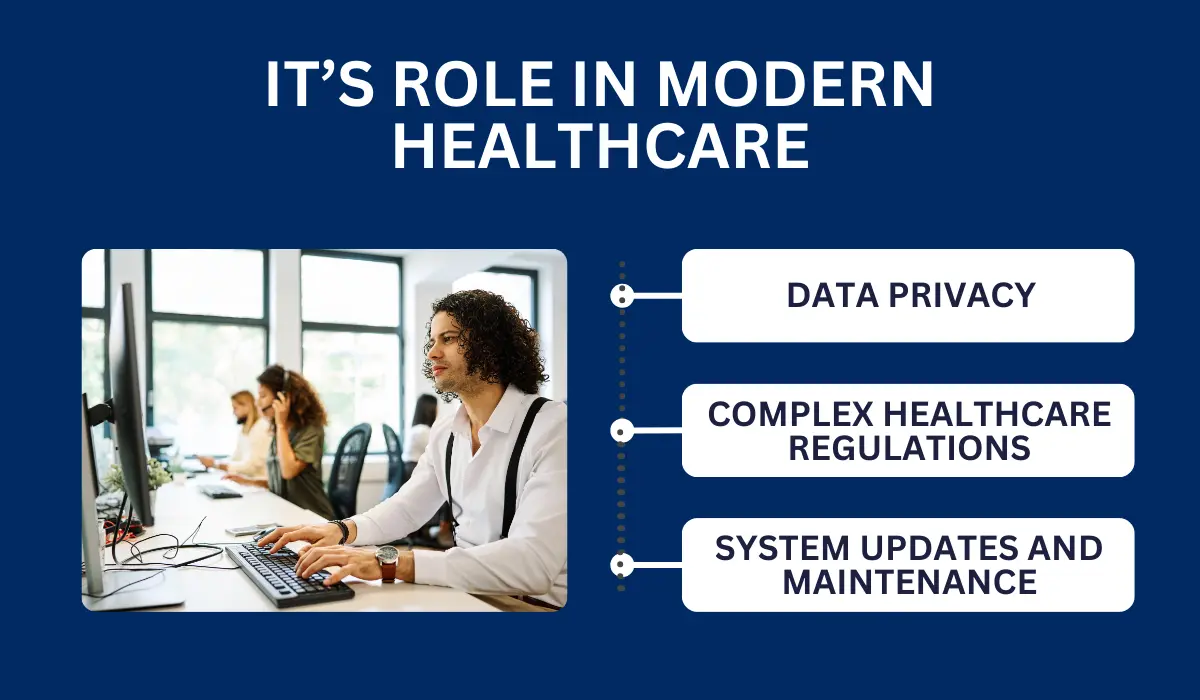
Healthcare providers play a crucial role in our society, and they also have access to some of our most personal data. In order for medical practices to operate efficiently, they need to digitize their systems and store this data online.
While switching from paper documents to digital operations is necessary for long-term success, it also comes with some unique security risks and operational challenges.
Research indicates that the healthcare industry is approximately 10 years behind other industries in adopting new business technologies. If that’s the case for your practice, working with a healthcare IT support provider can help you get your technical infrastructure up to speed — while also addressing some of the cybersecurity issues that come with digital operations.
Here’s why professional IT support is so important for healthcare providers.
Key Takeaways
- Healthcare organizations need to store patient data securely to adhere to HIPAA and maintain patient trust.
- IT providers help healthcare organizations with cybersecurity strategies, system configuration and monitoring, software updates, and more.
- Without an IT strategy in place, healthcare providers could be vulnerable to data breaches and fail to comply with essential regulations.
IT’s Role in Modern Healthcare

IT infrastructure and support play a very important role in modern healthcare operations. Here are three key areas where IT support services are necessary for healthcare practices.
Data Privacy
Healthcare organizations collect a huge volume of sensitive data as part of their regular operations. This includes a patient's medical records, personally-identifying information like birthdays and Social Security numbers, and billing information.
If patient data gets into the wrong hands, your organization could be subject to fines, lawsuits, or even criminal investigations. This could also result in severe damage to your reputation, causing you to lose patients.
The recent Change Healthcare cyberattack illustrates just how devastating a data breach can be for healthcare organizations.
During this attack, a substantial proportion of the American public had their medical data compromised, This brought medical billing to a standstill for several weeks as systems were offline.
Healthcare providers need a data privacy strategy in place to safeguard the valuable information they collect. IT professionals can help you set up a data security and privacy plan that makes sense for your organization.
Complex Healthcare Regulations
Because healthcare organizations work with such sensitive data, providers are subject to some of the strictest regulations of any industry.
These regulations specify what types of data healthcare organizations can collect, who can have access to it, and how that data should be stored.
A professional IT provider can help you develop a robust compliance strategy to ensure your organization is adhering to these regulations.
In particular, IT providers can help with HIPAA compliance and managing electronic health records. They can also help you get new software programs and service partners to ensure they are compliant.
Your compliance strategies will need to evolve as new technologies become widely accessible. Governments will likely put new regulations in place as time goes on, and healthcare professionals will need to adapt quickly.
IT professionals play an important role in adjusting to changing compliance standards.
System Updates and Maintenance
IT professionals also help healthcare organizations with system updates and ongoing maintenance.
Both software and hardware providers make periodic updates to their technologies to address security vulnerabilities. These updates need to be implemented soon after they’re released, otherwise you leave your systems at risk.
IT teams help their healthcare clients develop a regular update schedule that won’t disrupt their operations or cause extended downtime.
IT professionals also offer ongoing system monitoring for healthcare organizations. This monitoring helps identify potential cyber threats before they spiral out of hand.
Monitoring can also help you identify functional issues within the system that need to be addressed. On top of that, IT providers can also provide help desk services, which provide technical support for individual employees.
Finally, an IT team can help your practice put together a disaster recovery plan. In the unlikely event that your systems are affected by a cyber attack or natural disaster, a recovery plan will ensure business continuity so you can continue seeing patients.
Why Is IT Support Important for Healthcare Providers?
Professional healthcare IT services offer many benefits for providers. Here are some of the reasons IT support is so important in the healthcare industry.
Protecting sensitive data
Since healthcare providers have so much sensitive data in their systems, a cybersecurity defense system is very important.
A 2023 report indicated that 88% of healthcare organizations had experienced a cyberattack within the past year. IT professionals will help you put tools in place to protect sensitive data.
These include firewalls, antivirus software, network segmentation, and encryption. IT teams can also help healthcare providers implement secure patient portals.
A patient portal allows patients to access their medical records online. It also allows for messaging between patients and their doctors, which can make operations more efficient. Some patient
portals are even available on mobile devices.
In order for these patient portals to remain secure, you’ll need to implement an access management strategy. This includes setting up strong passwords and two-factor authentication. Access to professional IT services is necessary to implement these security measures.
Compliance
Remaining compliant with government and industry regulations is a must for any healthcare provider.
IT consulting firms for the healthcare industry are highly familiar with HIPAA and other data protection regulations. They can conduct system assessments to ensure that your technologies and processes are fully compliant with applicable regulations.
A proactive compliance strategy is necessary for all healthcare practices, regardless of size or specialty.
This is particularly important as data protection regulations shift to accommodate new technologies. For example, HIPAA was updated in 2023 to tighten cybersecurity restrictions and improve patient access to health records.
Minimize System Downtime
Even a small amount of downtime can be devastating for healthcare providers. When your systems are offline, it could result in delayed appointments, difficulty billing insurance providers, and a lack of access to important records.
Professional IT management helps minimize downtime with constant system monitoring. This allows them to catch potential problems and address them before they can take your system offline.
IT providers will also help you minimize downtime in the event of an emergency with a disaster recovery strategy. Disaster recovery focuses on restoring data backups and getting your most important operations back up and running as quickly as possible.
Client and Patient Trust
Today’s patients take data privacy and security seriously. They also enjoy the convenience of using sophisticated patient portals to communicate with their doctors. Sophisticated IT systems provide a great experience for patients and can help you gain their trust.
For B2B healthcare organizations, professional IT services will also help you build trust with potential clients. Your clients will also be subject to strict compliance regulations, so having a trustworthy IT team at your service indicates that you both take your digital operations seriously.
Avoid Unnecessary Costs
One of the biggest benefits of working with an IT provider is keeping your budget in check. Keeping your systems secure and compliant can come with a variety of extra costs, but an IT professional can help you prevent these costs from spiraling out of control.
For example, when installing new software programs, an IT support team can help you determine which features you need and which features are unnecessary. They can also help you identify new technologies to make your operations more efficient, which could save you money in the long run.
IT providers can also monitor your systems to help prevent small technical problems from spiraling out of control. Fixing even a small data breach can come with a high price tag.
The average total cost of a healthcare data breach is $9.48 million. Investing in tech support now will help you prevent these problems later on.
How Can Tech Advisors Help You?
Tech Advisors is a managed IT service provider (MSP) with specialized expertise in cybersecurity management and compliance. Working with an MSP is an efficient and cost-effective alternative to hiring an in-house IT team.
MSP services are customized to your businesses’ needs and can scale with you as your practice grows.
When you work with Tech Advisors, you get access to cybersecurity and compliance experts whenever you need them. We also offer ongoing IT support and system monitoring.
Tech Advisors takes time-consuming IT tasks off your hands so you can focus on what’s most important: patient care.
Schedule a consultation today to learn more about our IT support services for healthcare practices.


